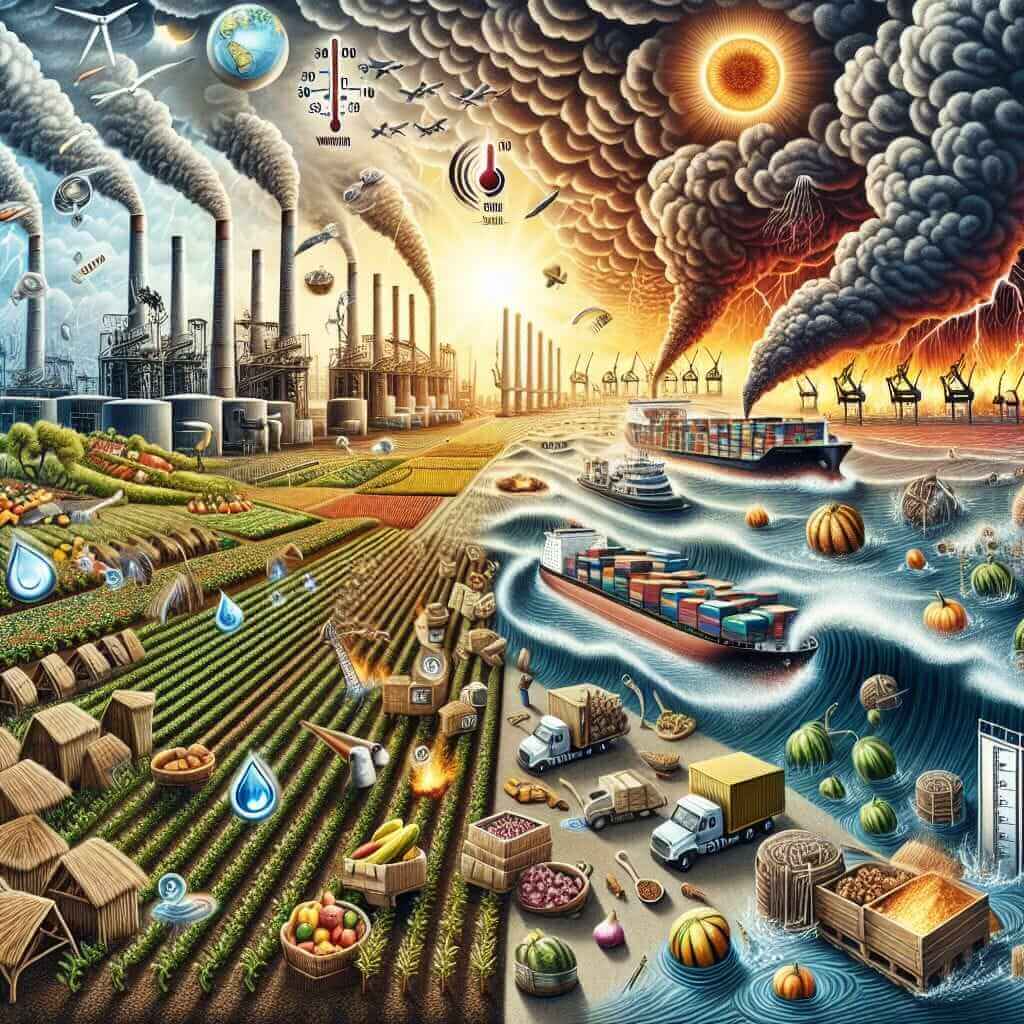Preparing for the IELTS Reading section can be daunting, and understanding contemporary topics, such as climate change and its impacts on the global food supply chain, is crucial. This article will elucidate how climate change affects food supply chains worldwide, providing not only a comprehensive reading sample but also practice questions and detailed answers for IELTS candidates.
Climate change has increasingly become a focal point in academic discussions and examinations, including the IELTS. Recent data suggest that topics related to climate change and environmental impact appear frequently in IELTS reading sections. Given its relevance, practicing on this topic could be highly beneficial for your IELTS preparation.
Practice Reading Passage
The Impact of Climate Change on the Global Food Supply Chain
Climate change is exerting profound effects on global food supply chains. As the Earth’s temperatures continue to rise, agricultural productivity is increasingly threatened. This passage explores how these climatic changes disrupt food distribution and what the future may hold for global food security.
Agricultural Productivity
Rising temperatures and erratic weather patterns have a significant impact on crop yields. Higher temperatures can lead to heat stress, adversely affecting plant growth. Changes in precipitation patterns result in droughts and floods, which diminish crop production. For instance, extreme droughts in regions like Sub-Saharan Africa have led to substantial drops in the production of staple crops such as maize and sorghum.
Food Distribution and Transportation
The transportation and distribution networks that constitute the global food supply chain are also vulnerable to climate change. Firstly, extreme weather events such as hurricanes and floods can disrupt transportation routes, causing delays and losses. Sea level rise portends the flooding of key infrastructure such as ports and roads, further exacerbating distribution challenges.
Economic Impact
These disruptions have a ripple effect on global economies. Lower crop yields lead to higher food prices, which disproportionately affect low-income populations. Additionally, insurance costs for food producers and distributors rise with the increasing frequency of climatic events, contributing to higher overall costs in the food supply chain.
Future Threats and Solutions
Future predictions indicate that without significant mitigation efforts, climate change could drastically reduce global food supply. Adaptation strategies, such as developing drought-resistant crop varieties and enhancing water management techniques, are vital. International cooperation and investment in sustainable practices will be key to safeguarding global food security.
Questions
Multiple Choice
-
What is the main effect of rising temperatures on crops?
- A. Increased crop production
- B. Heat stress on plants
- C. More rainfall
- D. Improved agricultural techniques
-
What regions are mentioned as being heavily affected by droughts?
- A. Sub-Saharan Africa
- B. Southeast Asia
- C. Northern Europe
- D. South America
Identifying Information (True/False/Not Given)
-
Extreme weather events always result in better crop yields.
- A. True
- B. False
- C. Not Given
-
Sea level rise can cause damage to ports and transportation routes.
- A. True
- B. False
- C. Not Given
Matching Information
-
Match the solutions with their corresponding concerns:
- A. Higher food prices
- B. Disrupted transportation
- C. Developing drought-resistant crops
- D. Enhancing water management techniques
Solutions:
- Sea-level rise
- Economic impact on low-income populations
- Lower crop yields
- Flooded infrastructure
Answers and Explanations
- B. Heat stress on plants – High temperatures cause heat stress which can adversely affect plant growth.
- A. Sub-Saharan Africa – The passage specifically mentions Sub-Saharan Africa as a region heavily affected by droughts.
- B. False – The passage indicates that extreme weather events result in diminished crop production, not better yields.
- A. True – Sea level rise is cited as a factor that could flood ports and transportation routes.
-
- 1. A – Higher food prices are a result of the economic impact on low-income populations.
- 2. B – Disrupted transportation is a solution for flooded infrastructure.
- 3. C – Developing drought-resistant crops is a response to lower crop yields.
- 4. D – Enhancing water management techniques address disrupted transportation due to flood infrastructure.
Common Mistakes and Tips
- Understanding the Context: Students often miss the broader implications of certain terms. For example, understanding how “heat stress” directly relates to “adversely affecting plant growth” is key.
- Fact vs. Inference: When dealing with True/False/Not Given questions, ensure you distinguish between what the text explicitly states and what is inferred.
Key Vocabulary
- Erratic (adj.): unpredictable, irregular | /ɪˈrætɪk/ | The erratic weather patterns disrupted traditional farming schedules.
- Precipitation (n.): rain, snow, sleet, or hail that falls to the ground | /prɪˌsɪpɪˈteɪʃ(ə)n/ | The region experienced changes in precipitation, leading to both droughts and floods.
- Mitigation (n.): the action of reducing the severity, seriousness, or painfulness of something | /ˌmɪtɪˈɡeɪʃən/ | Effective mitigation strategies are essential to combat the adverse effects of climate change.
Grammar Focus
When discussing future outcomes or predictions in the IELTS Reading section, you may encounter complex sentence structures such as conditional sentences or future perfect tense.
Example
- Conditional: If global temperatures continue to rise, crop yields will likely decrease.
- Future perfect: By 2050, if no mitigation actions are taken, the global food supply chain will have been severely affected by climate change.
Conclusion
To excel in the IELTS Reading section, familiarize yourself with contemporary issues like climate change and their effects. Practice with passages that simulate real exam conditions and pay close attention to vocabulary and grammar. Remember, consistent practice and understanding the intricacies of reading comprehension are key to scoring high marks.

By integrating these insights into your study routine, you are well on your way to achieving a higher band score in IELTS Reading. Good luck!